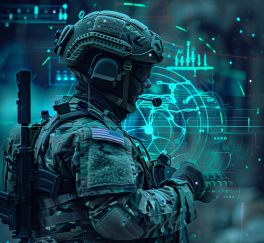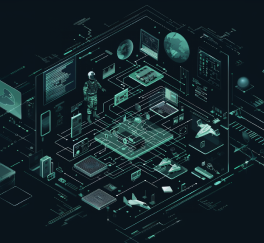Leveraging LLMs in Military Operations.
For military operations, the application of LLMs are as unique as they are impactful. From enhancing communication and intelligence gathering to optimizing logistics and cybersecurity, the potential uses of these AI systems are virtually limitless. By mastering LLM techniques through LLMOps, military organizations can unlock a multitude of capabilities to bolster their operational effectiveness.
-
Foundation Model Customization: Fine-tuning LLMs on specialized military datasets ensures that these models are aligned with the unique requirements of military missions. Through techniques such as retrieval augmented generation (RAG), LLMs can incorporate external knowledge sources, enhancing their decision-making capabilities.
-
Agent/Chain Management: Orchestrating interactions between multiple LLMs, APIs, and external systems requires sophisticated agent and chain management capabilities. By defining complex multi-step application logic and ensuring the robustness of agent chains, military organizations can maintain mission-critical functionality.
-
Guardrails for Operational Security: Safeguarding the integrity and security of LLM outputs is of paramount importance in military contexts. LLMOps frameworks incorporate guardrails to intercept adversarial inputs, enforce content policies, and monitor conversation contexts, mitigating risks and ensuring operational security.
-
Prompt Management and Optimization: Tailoring prompts for LLM interactions to specific mission requirements is essential for optimizing performance. LLMOps facilitates prompt management and optimization, enabling military personnel to create, store, and version prompts based on evolving mission objectives and user feedback.

Benefits of LLMOps Adoption for the Military
In today's dynamic and unpredictable military landscape, the adoption of LLMOps frameworks offers military organizations a host of strategic advantages, ensuring readiness, efficiency, and ethical integrity in the face of evolving threats and challenges. Let's delve deeper into the benefits of incorporating LLMOps into military contexts:
-
Enhanced Situational Awareness: LLM-powered analytics provide real-time insights into battlefield conditions, enemy movements, and threat assessments. This enables commanders to anticipate threats, assess risks, and formulate effective strategies in real-time.
-
Improved Decision Support: Access to timely and accurate information empowers commanders to make informed decisions rapidly. The analytical capabilities of LLMs help analyze vast amounts of data quickly, identify patterns, and generate actionable insights.
-
Operational Efficiency: LLMOps frameworks automate routine tasks, streamline workflows, and optimize resource allocation. This reduces manual labor, minimizes the risk of human error, and enhances operational efficiency in demanding environments.
-
Adaptability and Scalability: Enables rapid prototyping and deployment of new AI applications, ensuring readiness to address evolving mission requirements. This provides the military with a flexible and scalable infrastructure for AI development and deployment.
-
Ethical and Legal Compliance: Promotes responsible and ethical use of AI technologies in military operations. Adopting LLMOps helps incorporate guardrails and adherence to ethical guidelines to mitigate risks of bias and unintended consequences.
The adoption of LLMOps frameworks in military operations offers a multitude of strategic advantages, ranging from enhanced situational awareness and improved decision support to operational efficiency, adaptability, and ethical integrity. By harnessing the power of large language models within a robust operational framework, military organizations can gain a decisive edge, ensuring readiness to confront the challenges of today's dynamic and unpredictable operational environments while upholding the highest standards of ethics and legality.











